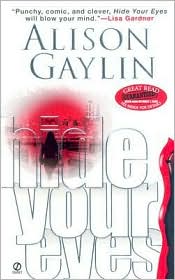Alison Gaylin: Fatal Obsession
An entertainment journalist for fifteen years, Alison Gaylin is the Edgar nominated author of HIDE YOUR EYES, its sequel YOU KILL ME, TRASHED and the upcoming HEARTLESS (due out in September.) TRASHED – which focuses on a reluctant supermarket tabloid reporter who uncovers a grisly series of Hollywood murders – just came out in paperback.
FATAL OBSESSION
When I was just out of college, I was a reporter for The Star. At the time, it was not the glossy celebrity rag you see today, but a down-and-dirty supermarket tabloid that tried every week to out-scoop The National Enquirer and The Globe.
I based my book TRASHED on my experience at The Star.
As anyone who has read the book might gather, I did spend a fair amount of time sneaking on to movie sets and into plastic surgeons’ waiting rooms, staking out celebrity homes, crashing weddings and funerals and, yes, raiding the garbage cans of the rich and famous.
But here’s something you might not know: Just as often, I was in the L.A. courthouse, interviewing lawyers, cops and forensic experts.
Celebrity and crime intersected frequently, usually with tragic results. There were the drug stories, of course – the arrests, the substance-related violence, the shocking overdoses. There were the crimes of passion – spousal abuse and date rape and murder. But the crime stories that seemed unique to celebrity – and the ones I found the most fascinating and scary to write – centered around obsessed fans. Unbalanced types who fell in love with stars – and who retaliated in terrifying ways when they learned their feelings were not reciprocated.
When I first came to work at The Star, a young actress named Rebecca Schaeffer had just been killed by an obsessed fan, Robert Bardo. Murderously jealous after seeing her in bed with a man in the movie, Scenes from the Class Struggle in Beverly Hills, Bardo hired a private investigator, who obtained her address for him by contacting the California Department of Motor Vehicles. After getting her autograph, Bardo returned to her door, rang the bell, and when she answered somewhat exasperated, he shot her point blank.
Rebecca Schaeffer’s death spawned stalking laws in California, which made it more difficult to obtain addresses of strangers — but that type of fatal attraction (the technical term for it is erotomania) didn’t go away. During the nine months I was at The Star, I covered a slew of celebrity stalkings, and became so fascinated with the phenomenon I wrote my master’s thesis on obsessed fans a year later, at Columbia’s Graduate School of Journalism.
TRASHED focuses on a Hollywood murderer, but not a classic obsessed fan. In an early draft, I did have a subplot involving one. But when the character became so strong he started to run off with my plot, I had to pull him out, give him a sex change and turn him into Myra Wurtz – the deranged (or is she?) protagonist of my short story, CHERISH, which can be found in the anthology A HELL OF A WOMAN on Busted Flush press.

In its pure form, I have always found the relationship between star and fan to be sort of poignant — the fan is completely focused on a person who doesn’t know her from a hole in the wall. She expects nothing more than a face on a screen, a voice on the radio, a poster on her bedroom wall. And though the star doesn’t know her by name or face, he needs her, he seeks out her support. It takes so little, though, for that harmless relationship to turn ugly.
Instances of erotomania continue, and I hate to say it, but I’m part of the problem. As entertainment journalists, our job is to give you those close-up photos, those intimate secrets… to make readers feel like they really know the stars The more contact an unbalanced person is given with a celeb, the closer they are allowed to feel, the more likely they are to assume a relationship that doesn’t exist… and then tragically, we find ourselves covering yet another stalking story.






Hi, Lee! You know, the paparazzi have always been pretty aggressive. When I was a reporter, there was one famous for flying over celeb homes and even private islands in a helicopter, with a telephoto lens. They are freelance by and large, though some work for agencies. The magazines an tabloids don’t have photographers on staff, though they tend to have favorites who they work with. It is a highly competitive field, and if you get the right shot, the pay can be six or even seven figures. Personality wise (and I don’t mean to generalize) they tend to be aggressive and fearless types with very thick skins who don’t mind insults, getting beat up, etc. There have been a lot of cases (ie bumping Lindsay Lohan’s car, or of course the Princess Diana tragedy) when they have been too aggressive, but in other cases it can be a two-way street. One celebrity — a papparazi magnet — routinely called the agencies and let them know when she was going out. Publicists are also known to do this — tip off the paps when a client is going out with a date, then express outrage over the invasion of their client’s privacy when the paps show up. The relationship between the paps and celebs is a complicated one — and a good book topic, I think!
Alison – I’m totally fascinated by your tabloid career. What’s our opinion on the paparazzi of today? Are they too aggressive? If so, what drives them? Is the pay that good? Are the freelancers more aggressive? And finally, how dangerous is that job?
Elena, it does make you understand why so many entertainers lead such private lives. Widespread popularity brings with it money and success and adoration and all sorts of good things — but there is a definite dark side to it as well.
Alison – for me this was the most upsetting essay we’ve had. Not being a fan of popular culture this aspect of “popularity” wasn’t on my radar screen. To be at such terrible risk for bringing enjoyment to so many, to say nothing of your family, is tragic.
Great question Michelle and I feel the same way. Celeb’s kids were definitely off limits when I was working as a tabloid reporter. In fact, many hid their kids’ faces in public (not just Michael Jackson!) because they feared stalkers and kidnappings. And as subjects of articles, they were techically not public figures, so there was much more fear of lawsuit. I’m not sure what’s changed since then, legally speaking. Regardless, I kind of cringe whenever I see full-on photos of Shiloh or Suri on magazine covers. Cute as they are, at that age I think seeing themselves on a random cover would actually be scary. (Maybe it’s because we’re both moms!)
Interesting, Alison. I confess to being hooked on Star, Us, & InTouch (always buy them when I fly). But I have to say that the fact that celebrities’ kids now seem to be as photographed as their parents disturbs me. IMHO the parents signed up for the kind of attention, most of them as adults, while the kids didn’t. It also seems like this is a new phenomenon; were the kids considered off-limits in the past? And what changed?